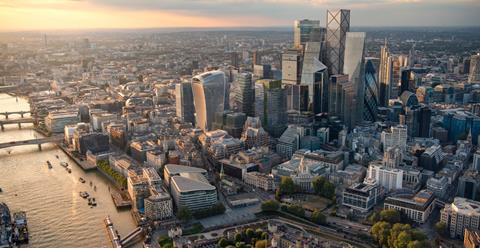New London Architecture report finds demand for office space is driving growth in towers despite slowdown in tall residential schemes

London is on course to have the most crowded skyline in Europe with nearly 600 tall buildings queuing up in the pipeline, according to a new report.
Some 583 schemes above 20 storeys are planned for the capital, more than double the 270 which have been built over the past decade, according to New London Architecture’s 10th annual tall buildings report.
The growth of towers is being fuelled by “roaring” demand for grade A office space, strong flows of overseas investment and a supportive planning environment, the NLA said.
The trend is particularly marked in the City of London, where the number of planning applications submitted in November 2023 was up by a quarter compared to the previous year.
Towers continue to proliferate despite a considerable slowdown of momentum for residential tall buildings caused by a slump in the housing market, higher interest rates and the requirement for second staircases, with only student accommodation schemes bucking this trend.
Outside of the City, the scale of towers is decreasing with the report finding more interest among developers for schemes between 12 and 18 storeys rather than the super tall buildings completed in the last 10 to 15 years in areas like Nine Elms and Elephant and Castle.
But housing densities across London have jumped over the past decade, with Tower Hamlets seeing the most dramatic increase from 1,000 habitable rooms per hectare to nearly 5,000 rooms per hectare.
The report also found a mixed picture in a survey of public sentiment to tall buildings as their presence is increasingly felt across the capital.
Half of Londoners now believe there are too many tall buildings in the city, up from 32% in 2014, but while just 27% said they would be happy to live in a tall building 10 years ago, 37% now say they could see themselves living in a high rise home.
The Shard has also knocked the Gherkin off its pedestal with the Renzo Piano-designed London Bridge pinnacle taking over from Foster & Partners’ City scheme as London’s favourite tall building in 2024.
NLA co-founder Peter Murray said: “Tall buildings have changed the face of London substantially over the last 20 years and will continue to do so – the pipeline that NLA has tracked means there is at least 10 years’ supply that has already been defined. London’s population continues to grow, passing the 10 million mark at the end of this decade.”
NLA director Catherine Staniland added: “While we’re now seeing a slowdown in momentum for residential towers, over the next 10 years, tall buildings will continue to play an important role in the capital and we are likely to see a much greater focus on sustainable construction, adaptive reuse and public accessibility.”
Recently unveiled towers in London include RSHP’s 54-storey 99 Bishopsgate, Eric Parry’s redesign of the 74-storey 1 Undershaft and Stiff & Trevillion’s 43-storey Bury House Scheme near the Gherkin.




























No comments yet